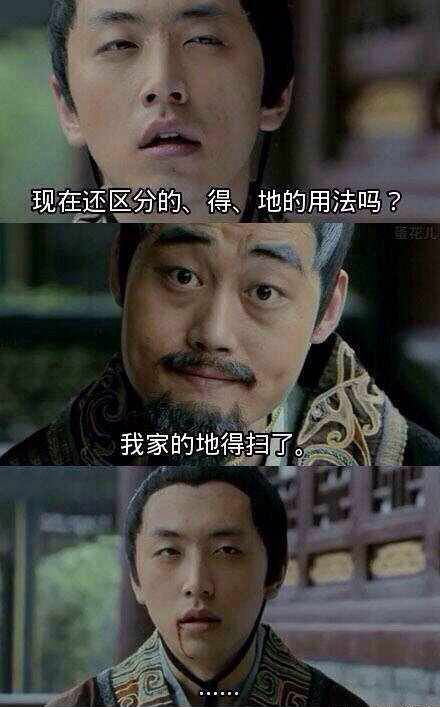The 3 “de” in Popular Culture
I’ve previously mentioned a song about the “three de“ (的, 得, 地) issue in Mandarin Chinese. Now it’s even been meme-ified using shots from a TV show:
1. First Guy: 现在还区分的、得、地的用法吗? [Nowadays do we still distinguish between the usage of the three de‘s?] 2. Second Guy: 我家的地得扫了。 [The floor in my home needs sweeping.] 3. First Guy: ……
The Joke
OK, truth be told, the second guy is cheating. While he did use all three “de” characters, he used two of them as different words from the structural particles that comprise the “three de‘s.”
The words he used:
1. 的: He used this one as an attributive, which is a kind of structural particle. This one is one of the “three de‘s”!
2. 地: As a particle, this word is pronounced “de,” and frequently comes after after adjectives-cum-adverbs, before verbs. However, here it’s pronounced “dì,” and means “ground” or “floor.” Not one of the “three de‘s.”
3. 得: As a particle, this word is pronounced “de,” and frequently comes after verbs. However, here’s it’s pronounced “děi” and means “must,” and comes before the verb 扫 (to sweep). Not one of the “three de‘s.”
So he used all three “de” characters (in a row!), but they weren’t the structural particles the first guy was talking about.
The real answer
In reality, the question which set up the joke is a good one: nowadays, do native speakers of Chinese distinguish between the “three de‘s” when writing?
The answer is yes and no. Professional writers certainly do. Teenagers texting their friends are typically pretty lazy and won’t pay much attention to the distinction (frequently over-using 的). Because so many people are typing these days, and predictive text isn’t so good at differentiating the three de‘s, lots of errors creep into common usage (in texts, on WeChat, on blogs, etc.), and everyone is used to seeing them. Some native speakers will even tell you that the distinction is unimportant.
So if you’re trying to write proper Chinese, then yes, you should pay attention to the distinction. If it’s just casual texting, no one is going to be horrified when you use the wrong de.


The other thing, of course, is that the written distinction is pretty recent, so it’s not as if this is some time-honored tradition that’s being violated here. There’s zero distinction between the three in speech, so if people can understand things there, IME-enforced use of 的 for 地/得 doesn’t seem likely to cause all that much of a problem.
We definitely have this problem in English with things like to, two, too, your, you’re, then, than, their, there, they’re, it’s, its… And it seems that only native speakers ever get confused by the differences between them. Since we learn speaking before we learn reading/writing, it’s more difficult to separate them. I wonder if Chinese children, at least initially, have trouble distinguishing 在/再 when they first learn the written forms?
YES! chinese children also make mistake ahout 在、再 ,when they are young
I’ve noticed myself getting lazy with these recently. None of my friends have pointed out when I make an error though. It seems to be pretty common to mix them up a bit.
When you watch a video you use 観る and not 見る, the textbook says, when hear it you use 聴く and not 聞く, the teacher says, but not even me who was suppose to be the foreigner learner who respect and love the language and want to do everything right cares to those rules.
[…] Fuente: Sinosplice https://www.sinosplice.com/life/archives/2014/05/29/the-3-de-in-popular-culture […]